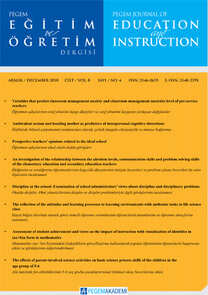An investigation of grade level and gender-based science achievement gaps in schools with different science achievement levels
Farklı fen başarı düzeylerine sahip okullarda sınıf düzeyi ve cinsiyete dayalı fen başarı farklılıklarının araştırılması
___
Acar, Ö. (2017). An investigation of the differences between students in low and high achieving schools and between female and male students based on motivational and cognitive variables in Turkey. Journal of the Human and Social Science Researches, 6(1), 500-518.Acar, Ö., Türkmen, L., & Bilgin, A. (2015). Examination of gender differences on cognitive and motivational factors that influence 8th graders' science achievement in Turkey. Eurasia Journal of Mathematics, Science & Technology Education, 11(5), 1027-1040.
Akpınar, E., Yıldız, E., Tatar, N., & Ergin, Ö. (2009). Students’ attitudes toward science and technology: An investigation of gender, grade level, and academic achievement. Procedia Social and Behavioral Sciences, 1(1), 2804-2808.
Alacacı, C., & Erbaş, A.K. (2010). Unpacking the inequality among Turkish schools: Findings from PISA 2006. International Journal of Educational Development, 30(2), 182–192.
Atalmis, E.H., Avgin, S.S., Demir, P., & Yildirim, B. (2016). Examination of science achievement in the 8th grade level in Turkey in terms of national and international exams depending upon various variables. Journal of Education and Practice, 7(10), 152-162.
Atar, H.Y. (2014). Multilevel effects of teacher characteristics on TIMSS 2011 science achievement. Education and Science, 39(172), 121-137.
Boz, Y., Yerdelen-Damar, S., Aydemir, N., & Aydemir, M. (2016). Investigating the relationships among students’ self-efficacy beliefs, their perceptions of classroom learning environment, gender, and chemistry achievement through structural equation modeling. Research in Science & Technological Education, 34(3), 307-324.
Bursal, M. (2013). Longitudinal investigation of elementary students’ science academic achievement in 4-8th grades: Grade level and gender differences. Educational Sciences: Theory & Practice, 13(2), 1151-1156.
Bursal, M., Buldur, S., & Dede, Y. (2015). Science and mathematics course success of elementary students in low socio-economic status among 4th-8th grades: Gender perspective. Education and Science, 40(179), 133-145.
Cavas, P. (2011). Factors affecting the motivation of Turkish primary students for science learning. Science Education International, 22(1), 31-42.
Ceylan, E., & Berberoglu, G. (2007). Factors related with students’ science achievement: A modeling study. Education and Science, 32(144), 36-48.
Dincer, M.A., & Uysal, G. (2010). The determinants of student achievement in Turkey. International Journal of Educational Development, 30(6), 592-598.
Eğitimi Araştırma ve Geliştirme Dairesi Başkanlığı. (2009). ÖBBS 2008: İlköğretim öğrencilerinin başarılarının belirlenmesi: Fen ve teknoloji raporu. Ankara: Earged.
Engin-Demir, C. (2009). Factors influencing the academic achievement of the Turkish urban poor. International Journal of Educational Development, 29, 17-29.
Hacıeminoğlu, E., Ertepınar, H., Yılmaz-Tüzün, Ö., & Çakır, H. (2015). Students and school characteristics related to elementary school students' views of the nature of science. Education 3-13, 43(6), 698- 719.
Johnson, M.A., & Lawson, A.E. (1998). What are the relative effects of reasoning ability and prior knowledge on biology achievement in expository and inquiry classes?. Journal of Research in Science Teaching, 35(1), 89-103.
Kalender, I., & Berberoglu, G. (2009). An assessment of factors related to science achievement of Turkish students. International Journal of Science Education, 31(10), 1379-1394.
Karasar, N. (2009). Bilimsel araştırma yöntemi: Kavramlar-ilkeler-teknikler. Ankara: Nobel Yayın Dağıtım.
Lawson, A.E., Banks, D.L., & Logvin, M. (2007). Self‐efficacy, reasoning ability, and achievement in college biology. Journal of Research in Science Teaching, 44(5), 706-724.
Martin, M.O., Mullis, I.V.S., Foy, P., & Stanco, G.M. (2012). TIMSS 2011 international results in science. Chestnut Hill: TIMSS & PIRLS International Study Center.
Milli Eğitim Bakanlığı. (2006). İlköğretim Fen ve Teknoloji Dersi (6, 7 ve 8. sınıflar) Öğretim Programı. Ankara: Talim ve Terbiye Kurulu Başkanlığı.
Milli Eğitim Bakanlığı. (2013). İlköğretim kurumları (ilkokullar ve ortaokullar) fen bilimleri dersi (3, 4, 5, 6, 7 ve 8. sınıflar) öğretim programı. Ankara: Talim ve Terbiye Kurulu Başkanlığı.
Milli Eğitim Bakanlığı. (2017). Fen bilimleri dersi öğretim programı (ilkokul ve ortaokul 3, 4, 5, 6, 7 ve 8. sınıflar). Ankara: Talim ve Terbiye Kurulu Başkanlığı.
Milli Eğitim Bakanlığı. (2018). 2018 Liselere geçiş sistemi (LGS): Merkezi sınavla yerleşen öğrencilerin performansı. Ankara: Milli Eğitim Bakanlığı.
National Research Council. (1996). The national science education standards. Washington, DC: National Academy Press.
NGSS Lead States. (2013). Next generation science standards: For States, by states. Washington, DC: The National Academies Press.
Senler, B., & Sungur, S. (2009). Parental influences on students' self-concept, task value beliefs, and achievement in science. The Spanish Journal of Psychology, 12(1), 106-117.
Sirin, S.R. (2005). Socioeconomic status and academic achievement: A meta-analytic review of research. Review of Educational Research, 75(3), 417-453.
Stark, R., & Gray, D. (1999). Gender preferences in learning science. International Journal of Science Education, 21(6), 633-643.
The Organisation for Economic Co-operation and Development. (2013). PISA 2012 results: What makes schools successful? Resources, policies and practices (Volume IV). Paris: OECD Publishing.
The Organisation for Economic Co-operation and Development. (2016a). PISA 2015 results (Volume I): Excellence and equity in education. Paris: OECD Publishing.
The Organisation for Economic Co-operation and Development. (2016b). PISA 2015 results (Volume II): Policies and practices for successful schools. Paris: OECD Publishing.
Topçu, M.S., & Yılmaz-Tüzün, Ö. (2009). Elementary students' metacognition and epistemological beliefs considering science achievement, gender and socioeconomic status. Elementary Education Online, 8(3), 676-693.
Yıldırım, H.H., Yıldırım, S., & Ceylan, E. (2017). Türkiye perspektifinden TIMSS 2015 sonuçları. Ankara: TED Yayınları.
- ISSN: 2146-0655
- Yayın Aralığı: 4
- Başlangıç: 2011
- Yayıncı: Pegem Akademi Yayıncılık Eğitim Danışmanlık Hizmetleri Tic. Ltd. Şti.
Özlem BELKIS, Yunus Emre GÜMÜŞ
Examination of teachers’ views on organizational uncertainty: A qualitative research
An extensive evaluation study of the English preparatory curriculum of a foreign language school
Canay KARCI AKTAŞ, Kerim GÜNDOĞDU
Yansıtıcı düşünmeyi kuram-uygulama bağlantısı yoluyla geliştirme
Bünyamin YURDAKUL, Gülsen ÜNVER
ÖZLEM BELKIS, YUNUS EMRE GÜMÜŞ
Öğretmenlerin örgütsel belirsizliğe ilişkin görüşlerinin incelenmesi: Nitel bir araştırma
Developing reflective thinking through theory-practice connection
GÜLSEN ÜNVER, Bunyamin YURDAKUL
Psychometric properties of the Student - University Match (sum) Questionnaire in Turkish
